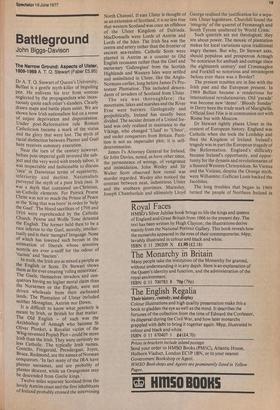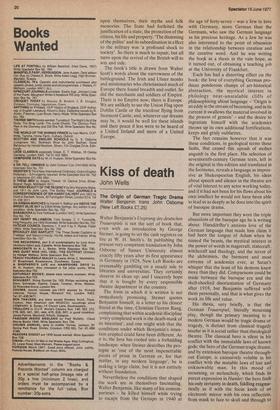Battleground
John Biggs-Davison
The Narrow Ground: Aspects of Ulster, 16O9-1969A. T. Q. Stewart (Faber £5.95)
Dr A. T, Q. Stewart of Queen's University, Belfast is a gentle myth-killer of beguiling pen. He enlivens his text from sources neglected by the propagandists who incestuously quote each other's slanders. Clearly drawn maps and battle plans assist. We are shown how Irish nationalism fed on a sense of unjust deprivation and dispossession. Under post-Reformation rule Roman Catholicism became a mark of the status and the glory that were lost. The myth of racial distinction between Planter and Gael here receives summary execution.
Near the turn of the century however, before post-imperial guilt invested the subject and the very word with trendy taboo, it was respectable and fashionable to discuss race' in Darwinian terms of superiority, inferiority and decline. Nationalists purveyed the myth of a pure Irish race. It was a ihyth that contained un-Christian, un-Catholic elements. For Patrick Pearse Christ was not so much the Prince of Peace as the 'King that was born' in order to 'help the Gael'. The blood sacrifices of 1798 and 1916 were reprehended by the Catholic Church. Pearse and Wolfe Tone detested the English. The former held then to be a race inferior to the Gael, morally, intellectually and in their 'mongrel' language. None of which has lowered such heroes in the estimation of liberals whose sensitive nostrils are ever a-sniff for the odour of 'racism' and 'fascism'.
In truth, the Irish are as mixed a people as the English or Scots. Dr Stewart shows them as for ever creating 'ruling minorities'. The Gaels, themselves invaders and conquerors having no higher moral claim than the Norsemen or the English, were not driven wholesale from their escheated lands. The Plantation of Ulster included neither Monaghan, Antrim nor Down. It is difficult to know what _precisely is meant by Irish, or British for that matter. The Old English — of such was the Archbishop of Armagh who became St Oliver Plunket, a Royalist victim of the Whig-invented Popish Plot — could be more Irish than the Irish. They were certainly no less Catholic. The typically Irish names, Costello, Fitzgerald, Prendergast, Joyce, Bruce, Redmond, are the names of Norman conquerors. 'In fact many of the IRA have planter surnames, and are probably of planter descent, while an Orangeman may be descended from Gaelic kings.' Twelve miles separate Scotland from the lovely Antrim coast and the first inhabitants of Ireland probably crossed the intervening North Channel. If east Ulster is thought of as an extension of Scotland, it is no less true that western Scotland was once an offshoot of the Ulster Kingdom of Dalriada. MacDonnells were Lords of Antrim and Lords of the Isles. The Irish Sea was the centre and artery rather than the frontier of ancient sea-realms. Catholic Scots were planted in Antrim as a counter to Old English recusants rather than the Gael and mercenary `Gallowglass' from the Scottish Highlands and Western Isles were settled and assimilated in Ulster, like the AngloNormans earlier, long before James I's Protestant Plantation. This included descendants of invaders of Scotland from Ulster.
The sea was thoroughfare; the mountains, lakes and marshes and the River Erne were barriers. Geologically and geopolitically, Ireland has usually been divided. The secular dream of a United Ireland was only realised in resistance to the Vikings, who changed `Ulaid' to 'Ulster', and under conquerors from Britain. Partition is not an imperialist plot; it is selfdetermination.
James I's Attorney General for Ireland, Sir John Davies, noted, as have other since, the permanence of wrongs, of vengeance and intimidation. John Wesley and Sir Walter Scott observed how venial was murder regarded. Wesley also noticed the contrast between neat, industrious Ulster and the southern provinces. Macaulay, Joseph Chamberlain and ultimately Lloyd George realised the justification for a separate Ulster legislature. Churchill found the 'integrity' of the quarrel of Fermanagh and South Tyrone unaltered by World Crisis.
Such quarrels are not theological; they are about power. The mosaic of plantation makes for local variations upon traditional angry themes. But why, Dr Stewart asks, should populous and prosperous Armagh 'be notorious for ambush and outrage since the eighteenth century' and Crossmaglen and Forkhill so notorious and intransigent before ever there was a Border?
The present troubles are in line with the Irish past and the European present. In 1969 Belfast became a rendezvous for international revolutionaries. Old 'parade' was become new 'demo'. 'Bloody Sunday' in Derry bore the trade mark of Marighella. Official Sinn Fein is in communion not with Rome but with Moscow.
Dr Stewart rightly places Ulster in the context of European history. England was Catholic when she took the Lordship and then the Kingdom of Ireland. Ireland's tragedy was in part the European tragedy of the Reformation. England's difficulty became Ireland's opportunity, and opportunity for the dynasts and revolutionaries of a fissured Western Christendom. So Vienna and the Vatican, despite the Orange myth, were Williamite; Gallican Louis backed the Jacobites.
The long troubles that began in 1969 turned the people of Northern Ireland in upon themselves, their myths and folk memories. The State had forfeited the justification of a state; the protection of the citizen, his life and property. 'The disarming of the police' and its subordination in effect to the military was 'a profound shock to society'. So there is much to repair; but all turns upon the revival of the British will to win and rule.
The book's title is drawn from Walter Scott's words about the narrowness of the battleground. The Irish and Ulster monks and missionaries who christianised much of Europe there found breadth and outlet. So did the merchants and soldiers of Empire. There is no Empire now; there is Europe. We are unlikely to see the Union Flag upon Dublin Castle or the tricolour flying from Stormont Castle; and, whatever our dreams may be, it would be well for these islands and their peace if less were to be heard of a United Ireland and more of a United Europe.



































 Previous page
Previous page